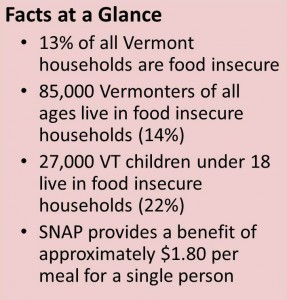By Marissa Parisi
 Marissa Parisi is Executive Director of Hunger Free Vermont, an education and advocacy organization with the mission to end the injustice of hunger and malnutrition for all Vermonters. We asked her to share her perspective on recent Farm Bill developments that may affect funding for the Supplemental Nutrition Assistance Program (SNAP).
Marissa Parisi is Executive Director of Hunger Free Vermont, an education and advocacy organization with the mission to end the injustice of hunger and malnutrition for all Vermonters. We asked her to share her perspective on recent Farm Bill developments that may affect funding for the Supplemental Nutrition Assistance Program (SNAP).
For over a year, Hunger Free Vermont along with the Vermont Farm Bill Nutrition Coalition has advocated passing a strong Farm Bill that both strengthens and protects the Supplemental Nutrition Assistance Program (SNAP), known in Vermont as 3SquaresVT. After failing to pass a Farm Bill in 2012, Congress has introduced three new versions of the Farm Bill, all of which would have devastating impacts on Vermont’s nutrition safety-net if they became law. With the Farm Bill set to expire September 30, we’ve been keeping a close eye on the legislative process in DC. Here’s what has happened so far this summer:
 In the Senate: On June 10, the Senate passed a Farm Bill that included a provision that limits the ability of states to operate “Heat and Eat” policies, which provide additional food benefits during the cold winter months when heating costs spike. According to the Congressional Budget Office, an estimated 500,000 households a year nationwide would have lost $90 per month in SNAP benefits. The average cost to heat a Vermont home during the winter is $3000, so the additional $90 per month food benefit for low-income families goes a long way.
In the Senate: On June 10, the Senate passed a Farm Bill that included a provision that limits the ability of states to operate “Heat and Eat” policies, which provide additional food benefits during the cold winter months when heating costs spike. According to the Congressional Budget Office, an estimated 500,000 households a year nationwide would have lost $90 per month in SNAP benefits. The average cost to heat a Vermont home during the winter is $3000, so the additional $90 per month food benefit for low-income families goes a long way.
 In the House: On June 20, the House decisively rejected a Farm Bill that would have harmed millions of struggling people in need of SNAP benefits. The committee bill put on the floor would have nationally cost two million low-income individuals their benefits entirely, 210,000 children would have lost their free school meals, and an additional 850,000 households would have seen their benefits cut by an average $90 a month. Had this legislation become law, thousands of Vermonter would have lost SNAP benefits entirely as well as disqualifying thousands of our school children for free school meals. In addition to the more than $20 billion in cuts to SNAP, amendments adopted on the floor would have allowed states to conduct random drug testing on food stamp applicants, permanently banned certain ex-offenders who have served out their sentences from ever being eligible for benefits, and imposed punitive and unrealistic work and training rules that would have to led to the end of benefits for people desperate to find jobs but unable to find them.
In the House: On June 20, the House decisively rejected a Farm Bill that would have harmed millions of struggling people in need of SNAP benefits. The committee bill put on the floor would have nationally cost two million low-income individuals their benefits entirely, 210,000 children would have lost their free school meals, and an additional 850,000 households would have seen their benefits cut by an average $90 a month. Had this legislation become law, thousands of Vermonter would have lost SNAP benefits entirely as well as disqualifying thousands of our school children for free school meals. In addition to the more than $20 billion in cuts to SNAP, amendments adopted on the floor would have allowed states to conduct random drug testing on food stamp applicants, permanently banned certain ex-offenders who have served out their sentences from ever being eligible for benefits, and imposed punitive and unrealistic work and training rules that would have to led to the end of benefits for people desperate to find jobs but unable to find them.
On July 11, despite strong opposition from the Senate, President Obama, and hundreds of farm and food organizations, the House passed a partial Farm Bill that stripped SNAP from the legislation. We believe this was yet another attempt to drastically cut SNAP and weaken the program. The House is now contemplating a SNAP-only bill next, one that would likely see deeper program cuts than the previous bill.
Looking ahead: Right now, we’re not sure what’s next, considering no bill has made it to conference. Congress may choose to pass a one or two-year extension to keep existing programs in place. However, all families on the SNAP program will have their benefits cut in November due to a reduction in the ARRA boost which was added to SNAP recipients’ benefits in April 2009. As families slowly recover from this recession, now is not the time to cut SNAP or reduce benefits. SNAP sheltered millions of Americans (including 1 in 5 children) from falling below the poverty line since 2008. When our economy fully recovers and people get back to work, SNAP will cost our country less in benefits as the program will shrink on its own. Our message for Congress is SNAP works and will continue to work as the economy recovers. We should strengthen and protect one of the most effective programs ever created to improve nutrition, prevent domestic hunger, and strengthen our economy.










